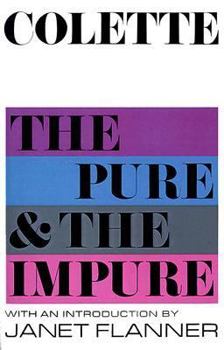The Pure and the Impure
Select Format
Select Condition 
Book Overview
Colette herself considered "The Pure and the Impure" her best book, " the nearest I shall ever come to writing an autobiography." This guided tour of the erotic netherworld with which Colette was so... This description may be from another edition of this product.
Format:Paperback
Language:English
ISBN:0374506922
ISBN13:9780374506926
Release Date:January 1967
Publisher:Farrar Straus Giroux
Length:192 Pages
Weight:0.55 lbs.
Dimensions:0.5" x 5.5" x 8.6"
Customer Reviews
2 ratings
Autobiographical insights
Published by Thriftbooks.com User , 22 years ago
The Pure and the Impure by Sidonie-Gabrielle Colette with introduction by Judith Thurman (Literature/Gay Studies). Recommended.Colette believed The Pure and the Impure was her best work. I can't judge, not having read anything of hers but a few short stories, but this collection of her observations about human attitudes toward relationships and sexuality is insightful and timeless. It is also difficult and obscure at times, perhaps because of the translation and because there is no real structure to such a collection.Thanks to her milieu, her position in it, and her willingness to seek the story, Colette could draw upon the most interesting people of her time-the givers and the takers. From the older woman who publicly fakes an orgasm while self-pleasuring in an opium house to gladden the heart of her young, sickly lover to the roué who exclaims of women, "They allow us to be their master in the sex act, but never their equal. That is what I cannot forgive them" to the circle of prominent women who learn the ways of sex from servants, dress as men, and love horses (she calls the most notable of these women "La Chevalière) to the "happy," alcoholic, lesbian poet Renée Vivien to the gay men with whom she seems most comfortable, Colette covers a spectrum of sexuality and combinations-including those men and women who play their heterosexual and homosexual relations against one another."I'm devoted to that boy, with all my heart," the older woman tells Colette, a stranger to her. "But what is the heart, madame? It's worth less than people think. It's quite accommodating. It accepts anything. You give it whatever you have, it's not very particular. But the body . . . Ha! That's something else, again." Thurman believes this sums up Colette's view precisely, the heart as a slave to the body.Although Colette apparently wanted to remain an impartial observer, she cannot mask her own feelings and biases. One senses that she could not quite see a woman-woman partnership as "whole," as passionate, as capable of being the source of tragedy in the same way as other types of relationships. (Anaïs Nin will also hint at something similar in her diaries, at the "incompleteness" of female/female love.) "What woman would not blush to seek out her amie only for sensual pleasure? In no way is it passion that fosters the devotion of two women, but rather a feeling of kinship." She is fascinated by the story of Lady Eleanor Butler and Miss Sarah Ponsonby, the "Ladies of Llangollen," who elope and spend several decades living together. During this time, Butler will keep an extensive journal about her life with "My Beloved," while, to Colette's consternation and fascination, Ponsonby remains a silent partner. Colette so romanticizes the Ladies that she says they run off together as "young girls," when in fact Butler was 39 and Ponsonby in her 20s. While there is all kind of detail about their living arrangements, from gardening, sewing, hosting an array of distinguished v
Anthropologist of the Sensual
Published by Thriftbooks.com User , 22 years ago
Colette, perhaps best known to Americans as the author of "Gigi" (1945) was a prolific French novelist, critic, playwright, and performer. She also wrote the four "Claudine" novels (1900-1903), and became celebrated for "Cheri" (1920; followed by "The Last of Cheri" in 1926).She regarded "The Pure and the Impure" as her best work; a mostly autobiographical treatise on Eros and love, particularly Sapphic love. She mixes a reporter's objectivity with deeply felt analysis psychological and philosophical observations. Sometimes she takes a dispassionate, almost distant look at passion; other times her emotional attachments to her subjects--primarily lesbian aristocrats and artistes--are candidly exposed.She is an exquisite writer without being precious. Colette bends words and phrases perfectly, and one is struck by her vivid yet subtle prose, as evocative as Woolf but perhaps even more sensual. "The Pure and the Impure" contains memorable passages of keen observation and wit, and one feels drawn to her observations:"...I delighted in the...empty gaiety of the chatter and the diverting and challenging exchange of glances, the cryptic reference to certain treasons, comprehended at once, and the sudden outbursts of ferocity. I reveled...in their half-spoken language, the exchange of threats, of promises, as if, once the slow-thinking male had been banished, every message from woman to woman became clear and overwhelming, restricted to a small but infallible number of signs..."This is not to deny, however, that reading the book is sometimes difficult. Whether due to the translation, the era, or Colette's particular style, her writing can be challenging, particularly her last chapter, a very subjective, personal description of jealousy.This is a beautifully written book about the erotic, about men and women, and about the natural history of love. I urge you to introduce yourself to her writings. Highly recommended.





